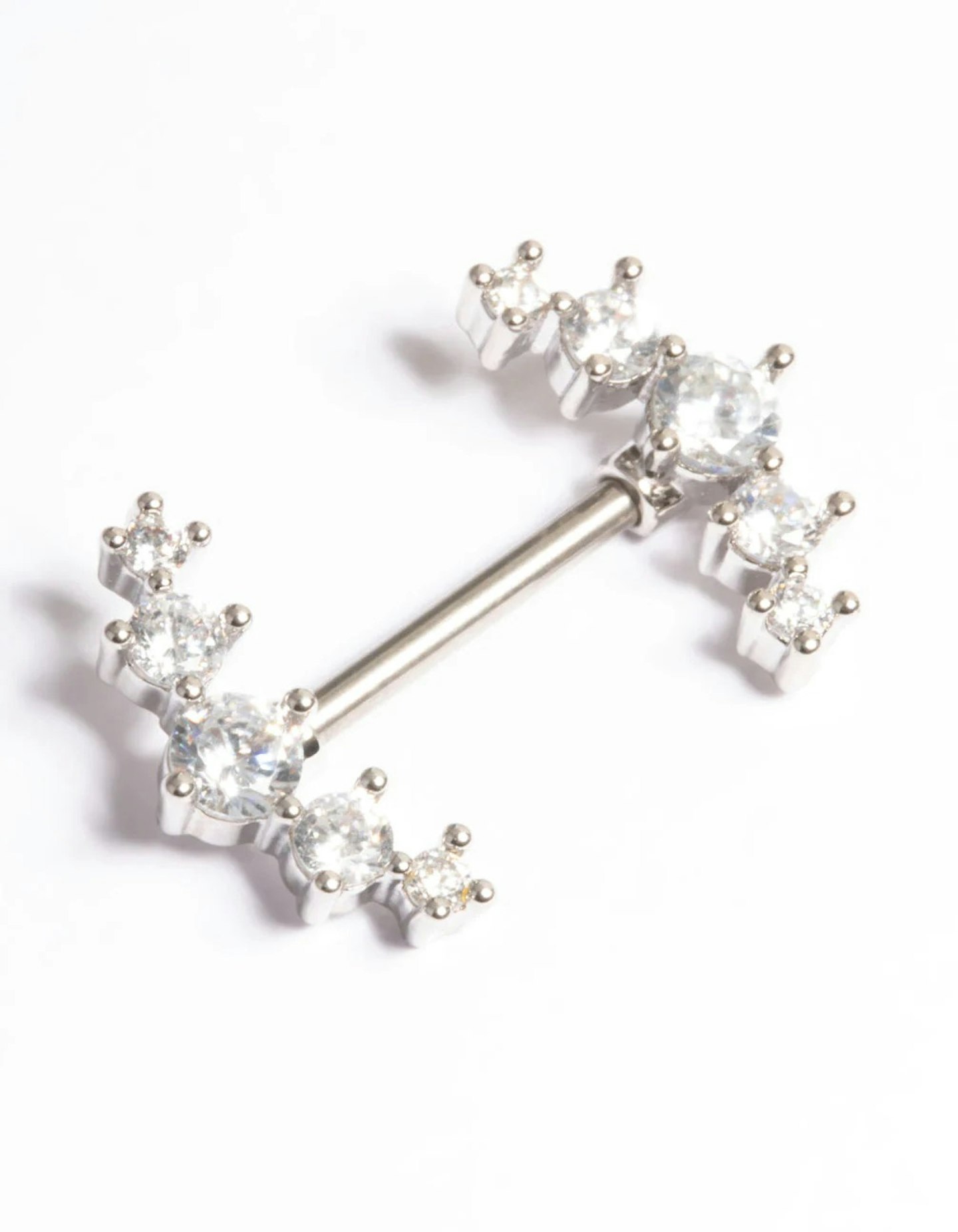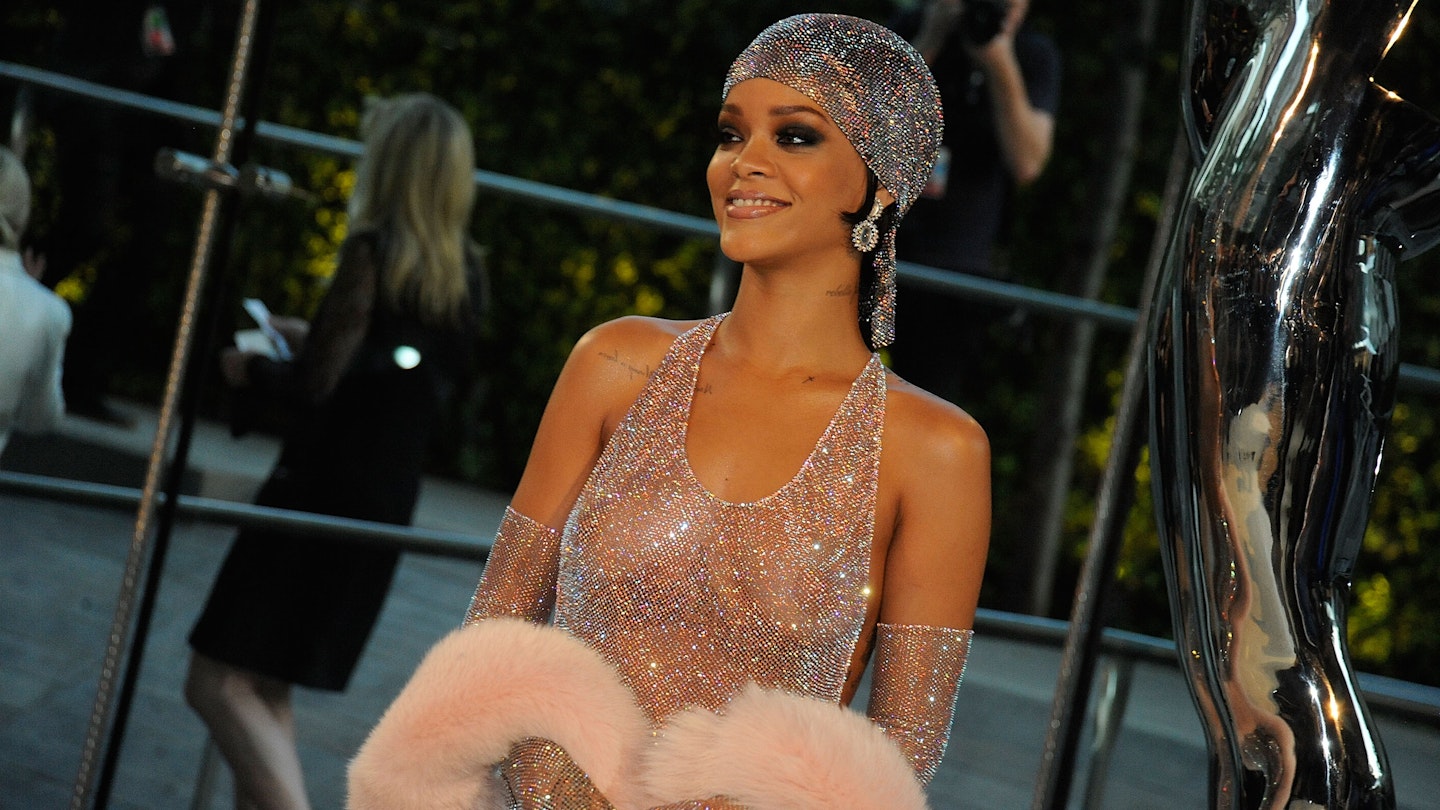Ever wanted to get your nipples pierced but not sure what to expect? Want to know how much they hurt and how much they actually cost? There are a plethora of questions that surround the prospect of getting a piecing whether that be multiple, stackable ear piercings, the ever-cool nose piercing or the tongue piercing. Nipples in particular require some thought, thanks to their sensitive nature. So before you consider getting your nipple pierced à la Rihanna, Bella Hadid and Kendall Jenner, make sure you know all the facts, do your research and visit a reputable piercing shop with a professional piercer. Here's everything you need to know about nipple piercing.
Do nipple piercings hurt?
Bad news if you’re a piercing veteran, it’s NOTHING like any other body modification. The nipples are packed with nerve endings which makes the area ultra-sensitive. Imagine that nice feeling when your other half gently caresses your nipples (some lucky ladies can even orgasm this way) and swap those gentle hands for a solid metallic jab of metal. It’s a strange type of pain that some people might enjoy if they’re so way inclined, but for most of us, it won’t exactly be a walk in the park. The only bonus is that it’s over very quickly.
The piercing can be less painful for some and it all depends on how sensitive your nipples are. The pain you feel only lasts a short time while getting the piercing, however many feel pain for a few days after having it done. While the piercing is healing, it can be painful if you catch it on something - the same as any other piercing.
Head Piercer at Laura Bond, Sarah Crowe, says 'The pain involved in a nipple piercing will vary with each individual. Seeking a reputable piercer will definitely help with this. The pain feels more like a dull pressure than a sharp pain and should only last a few seconds.'
What happens when you get your nipple pierced
Crowe explains, 'Nipple piercings are performed at the base of the nipple. They can be pierced vertically, at an angle but most commonly horizontally and should only be performed by a licensed professional with a single use sterile needle. As with any other piercing, they should either be performed with titanium or 14k or 18k gold jewellery. These options are nickel-free and safe to wear in the body at all times. A slightly longer barbell at no thinner than 14 gauge is the best option for the initial piercing to allow for swelling and to minimise movement.'
As you've probably gaged, the area is sensitive so caution is advised. Kelly adds, 'it’s very important to avoid the areola so accurate marking is crucial to avoid complications, clamps are used to hold the position for the piercing and we use a 1.6 needle for this piercing.'
It's important to note that the piercing should be placed in the nipple itself and not the areola (the coloured patch of skin around the nipple) as this will cause issues when the nipple retracts making the piercing sink into the skin, Kelly explains.

How long do nipple piercings take to heal?
For the first week or two, you’ll be instructed to keep it covered and to avoid soaking it in the bath in order to keep your piercing away from harmful bacteria. Try and resist the temptation to show it off to your friends until the healing process is complete.
'Everyone heals at different times and these particularly can take 6-12 months plus to heal. It is always a good idea to make a check up appointment with your piercer 2-3 months after your piercing to check if it is ready to be downsized. This involves changing the bar for something slightly smaller, to reduce risk of catching and help aid healing. When it is fully healed then a ring can be worn if preferred,' says Crowe.
As long as you clean it twice a day with a salt water solution (or saline solution), then you shouldn’t have any problems. In the meantime it’s important to keep it clean and avoid getting it caught on your clothes. This makes saucy lacy lingerie a bit of a risk. If you’re going to a music festival or on holiday, be extra careful when it comes to keeping it clean and free from infection. Skipping out is seriously not worth the risk.
Everyone's nipple is different of course, but it is likely you will get a tiny scar (I mean come on, it has had a bar rammed through it!). A lot of people find that when they remove their piercing, they get a teeny bubble where the bar went in and out. To combat this it is recommended to massage skin-friendly oils (think jojoba, bio or baby oil) into the scarred area.
Can you breastfeed with nipple piercings?
You can still breastfeed, but you’ll have to negotiate your piercings when the time comes. Some woman switch to bars and simply take them out when it’s baby’s dinner time, only to slip them back in once they’re all fed. GP and Cosmetic Doctor, Dr Sonia Khorana says, 'The scar tissue certainly doesn’t prevent you from breastfeeding. The piercing can be a choking hazard and needs to be removed to allow the baby to latch properly.'
'Nipple piercings should not affect breastfeeding if they are pierced safely but jewellery should be removed when feeding to avoid a choking hazard and to allow the baby to latch properly. There may be an increase in milk flow through your piercing channel and you may experience some leakage in between feeds,' Crowe points out.
How to clean nipple piercing
Cleaning is of the upmost importance when helping to prevent the development of infections in a new piercing. Manager of Underground Tattoos, Jamie Kelly, says, 'We would suggest a pre made saline solution twice a day and to avoid twisting the jewellery, it’s important not to go swimming for 2-3 weeks after getting them pierced as this can increase the risk of infection.'
Crowe agrees and adds, once cleaned they should be 'dried thoroughly with clean kitchen roll or unwoven gauze. Then they should be left alone! No twisting, no turning and not letting anyone else touch them.'
She also states, to make sure your piercing doesn’t become infected, it is very important to avoid touching them with dirty hands, thoroughly drying them after cleaning and making sure any clothing, bedding and towels that come into contact with your piercing are kept clean. Always check with your piercer if you think you may have an infection and if this is the case, they will refer you to your GP.
Are nipple piercings safe?
The obvious dangers are that you may get an infection. Dr Khorana weighs, 'It’s important to remember that is an invasive procedure which can carry health risks (such as infections) and should always be undertaken by an experienced and qualified practitioner, after informed discussion. Piercing the wrong spot can cause issues with breastfeeding in the future and even permanent damage to the areola or nerve damage. You could also be left with scar tissue around your nipple if you ever chose to take the ring out.'
While she points out that infections should be rare if done in a sterile environment, they can still happen and bleeding can also occur. If you notice that your breast starts to swell or there is a tender bump, lump or you’re experiencing pain on the inside of your breast or in your armpit, Dr Khorana advises you should remove the piercing immediately and seek medical attention straight away. 'You may need oral antibiotics depending on the severity of the infection. You might notice temperatures and there is a risk of sepsis if early infection isn’t treated on time.'
Kelly adds, 'They are safe if done correctly and they shouldn’t have any issues healing. It is super important to pierce them correctly as piercing the wrong spot can cause issues with breastfeeding in the future and permanent damage to the areola, they can get infected by not cleaning them every day and it’s important to have clean bras on all the time to avoid bacteria building up.'
'The most common issues are infection and bleeding which can occur shortly after piercing and can continue even months after the piercing, it can also cause scar tissue and nerve damage.'
They can also scab, like any other piercing. But if you are worried about excess scabbing, you should contact your body piercer as a first port of call. More often than not, however, they will tell you to speak to a GP if they think the infection requires urgent attention.
Signs of nipple piercing infection
-
Sensitive or painful nipple
-
Swelling, lump and tender feeling inside breast
-
Discharge or foul smells
-
Body aches
-
Fever
-
Rash
-
Fatigue
-
Redness
Shop: Nipple Jewellery

www.lovisa.co.uk
Description
Made from titanium, this dual diamonte encrusted bar is a subtle yet decadent addition.
How do I remove my nipple piercing?
Most piercings are fitted with screw ball bars and hoops. It may take a little bit of time to initially remove it, but the important thing to remember is 'they can be removed with clean hands by unscrewing one of the balls on either side of the bar and gently removing the bar, I would suggest cleaning the area down after removal. This piercing does tend to close up very fast and anymore then 2-3 days without jewellery, it will have closed up,' says Kelly.
If you’re struggling, then simply pop in and see your piercer and ask them to remove it for you – they’ve dealt with these fiddly little things loads of times before.
How much do nipple piercings cost?
Depending on the piercing studio, it can cost anywhere between £25-£50. The average price is usually around £40 but can be more expensive depending on the jewellery you choose. If you plan on getting both your nipples pierced, you can normally negotiate a 2-for-1 offer, but they may ask you to pay before the piercing, which means you CAN’T chicken out!
How old do you have to be to get your nipples pierced?
In the UK you must be over the age of 18, and the studio may be breaking the law if they offer piercings to anyone younger.
Sameeha Shaikh is Grazia UK's Beauty Writer, working across all categories to bring you insights on the latest trends, industry news and the products you need to know about, viral or not (most probably viral).
Pictures: Getty, Rex
